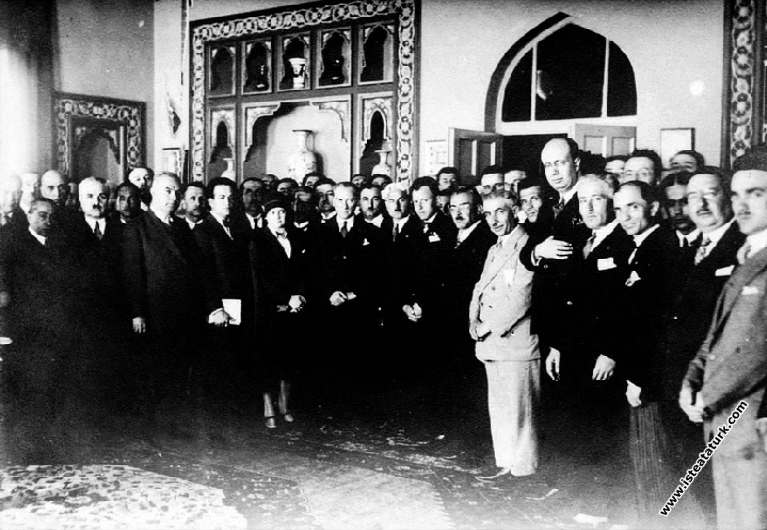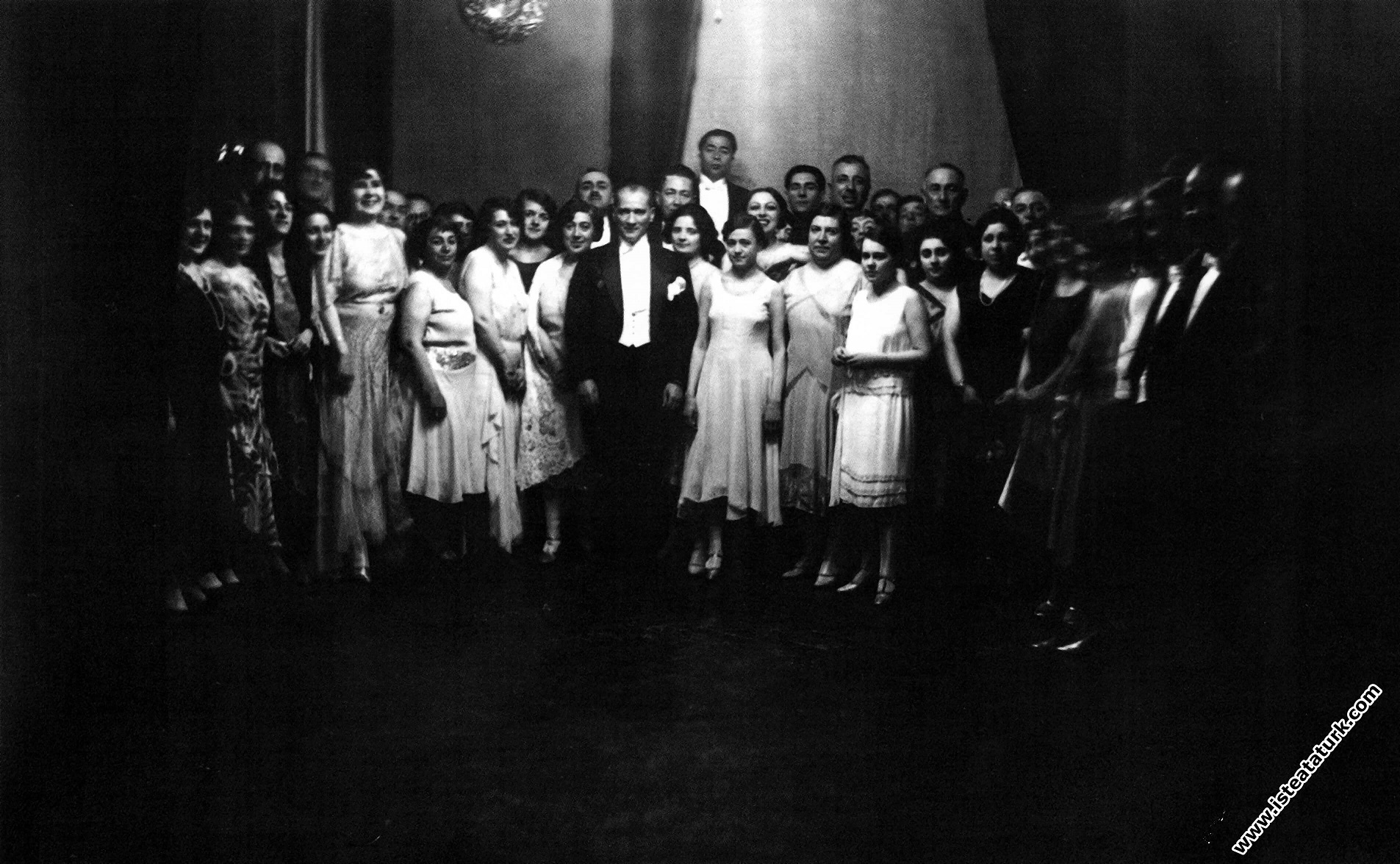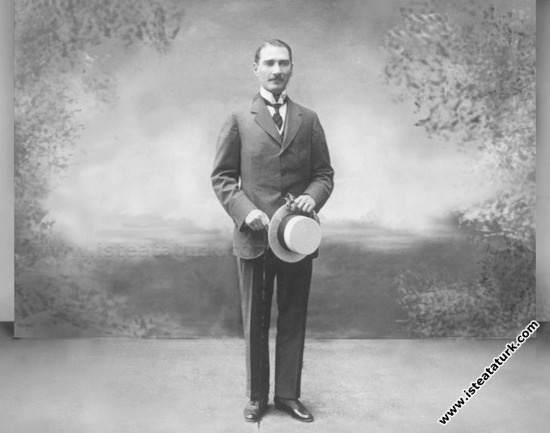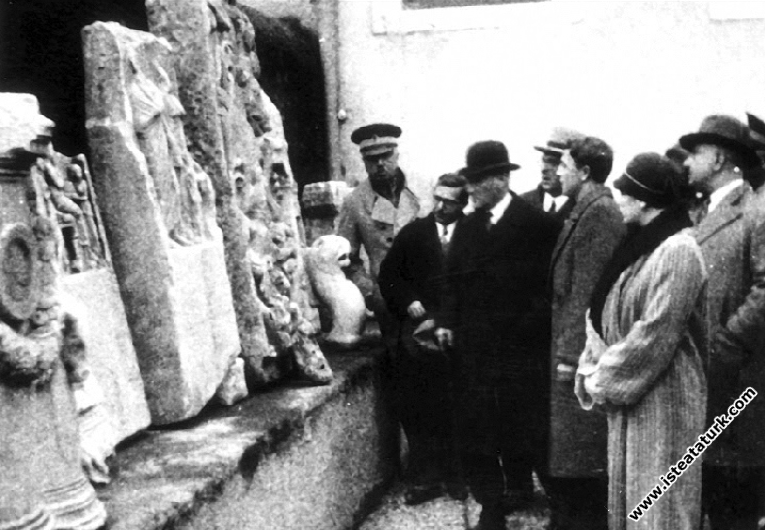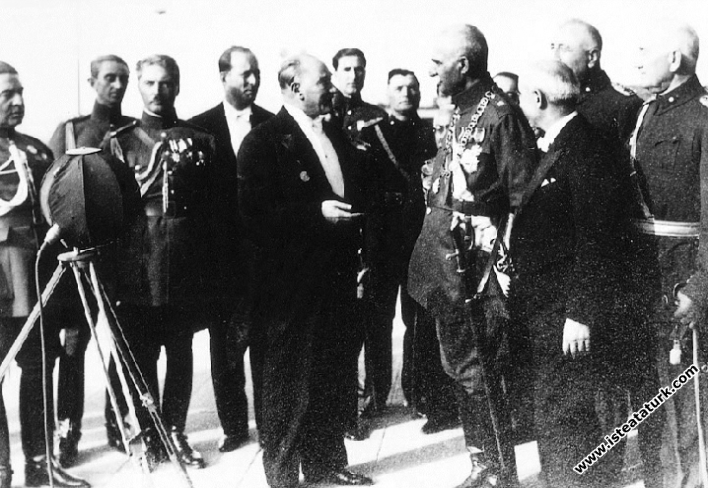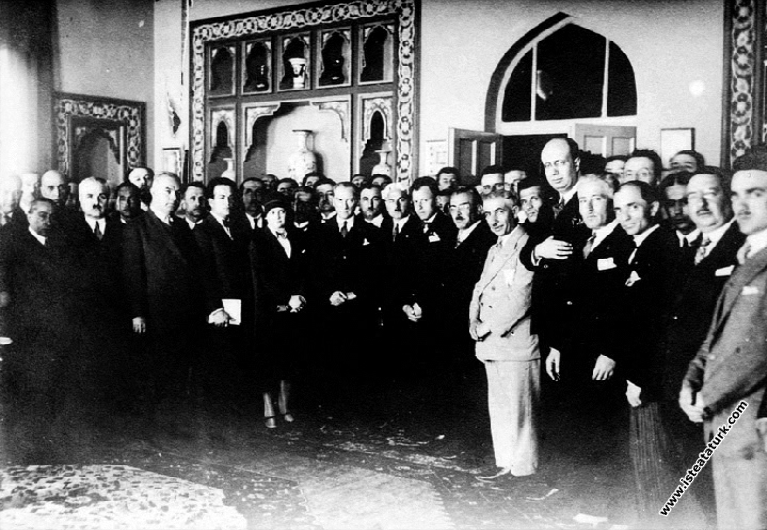
Atatürk's Role in the Formation of Art Institutions
Character Size
Atatürk's Role in the Formation of Art Institutions
ATATÜRK'S ROLE IN THE FORMATION OF ART INSTITUTIONS
It has been half a century since the great Atatürk left us. We commemorated him all over the country on November 10, and we will remember him from now on. As you know, changes have been made in the forms of commemoration this year and it has been decided to abandon the mourning style.
It is necessary to take Kemalism not as a static concept, but as a dynamic ideal and keep it alive. For this reason, the purpose of remembrance days should not only be to commemorate, respect and renew the pain due to his loss, but also to understand and explain him better, to adapt his ideas to the new conditions of the coming day and to try to reach his ideal.
Atatürk's ideal was to raise the Turkish nation as a civilized and prosperous nation, with his own words "to raise it to the level of contemporary civilizations". For this, besides the progress in science and technology, there is no doubt that progress in art and culture is required. When Atatürk said “contemporary civilizations”, he meant the West. As the English poet Rupert Brooke, who died in World War I, said: the West, who boarded their ships with the spirit of a crusade, saluting the crescent and star flag of the Turk, whose wrist they could not bend, from this land where they came to take Istanbul from the Turks. Atatürk interprets this orientation as follows: “The understanding of civilization of the East,
Here, the Great Leader's realistic side, his side that does not mix emotions and thoughts, shows itself, and he can see the necessity of turning to the West as a method by comparing the progress of the Western world in the last few centuries with the Eastern societies.
It is a fact that we all know that culture and art come first among the elements that make human societies a society. Education and training are essential for this. In this regard, Atatürk said, “Two armies are needed to bring our country and society to the goal of truth and happiness. One is the army of soldiers that saves the life of the country, the other is the army of wisdom that kneads the future of the nation... Unless a nation has an army of wisdom, no matter how brilliant victories it achieves on the battlefields, its fruits are doomed to perish. It is only possible for victories to give continuous results with the army of wisdom”, he says. Here, Atatürk saw the need to create an army of wisdom towards the West as a method, and while he was trying to establish science and art institutions that he saw suitable for this purpose, he showed art as one of the foundations that would keep a nation alive. He pointed out that a nation deprived of artisans cannot have a full life and said, “A nation without art means that one of the lifebloods of a nation has been severed.” summed up his views.
The orientation to the West, which we mentioned above, began to bear fruit in art institutions, especially in art education and training institutions, in the years immediately following the Republic.
Established in 1883, Turkey's first art education institution, Sanayi-i Nefise Mektebi, developed with the addition of the decorative arts department in 1924, next to the architecture, painting and sculpture departments, and settled in Çifte Saraylarlar in Fındıklı, the current central building of our University, in 1926. Atatürk in one of his speeches about Fine Arts: “People need some things to be perfect. A nation that cannot paint, a nation that cannot do what science requires, must admit that that nation has no place in the path of progress.” He attaches so much importance to this issue as to say, “... Another historical characteristic of the Turkish nation is to love the fine arts and to rise in it... For this reason, it is our national ideal to develop our nation's love for fine arts by constantly feeding them with all kinds of means and measures. He determined the reason for his actions with his words. Again, as Atatürk said, “Any nation in the world that wanted to be civilized, advanced and developed would definitely sculpt and train sculptors.” Atatürk especially emphasized the subject of sculpture and thus showed his attitude towards conservatism in some circles. In these years, while young people were sent abroad to train sculptors, artists such as Kanonika, Krippel and Hanak were invited to Turkey to make the first monuments of our Republic. As early as 1927, painting and sculpture exhibitions began to open. Finally, in 1937, with the directive of Atatürk, the Painting and Sculpture Museum was established in the Crown Office of the Dolmabahçe Palace under the Academy of Fine Arts. And it was opened by the Great Leader himself in this hall we are in now.
One of the most important artistic events brought by the Republic was the conversion of the Music Teachers' School to the Conservatory. Atatürk said the following in his opening speech to the Grand National Assembly in 1934: “Friends, I know how you want the youth of the nation to be promoted in all fine arts. This is done. However, in my opinion, it is Turkish music that should be brought to the fore the quickest. The measure of a nation's new change is to be able to perceive and comprehend the change in music."
“The music that is attempted to be listened to today is not ours, it is far from being of a disgraceful value for him. We must know this clearly. It is necessary to collect high sayings and phrases expressing national, subtle feelings and thoughts, and to process them according to the general final music rules the day before. However, Turkish national music can rise in this way. It can take its place in universal music…”
With these words, which have started a debate that has continued until today, Atatürk does not want to express that he is against real Turkish music, even if it is monophonic, but that our music as it stands at that time does not suit "us", that is, the young and dynamic republic, in terms of creation and performance. Is it possible that Atatürk, who spoke of "collecting high phrases and phrases expressing national and subtle feelings and thoughts" and "the need to process them the day before, according to the general final musical rules", completely rejects the music that has come to its day? Can he reject the folk songs that come from the heart of the people and are the work of a real culture and tradition, long airs, bozlaks, and all of our classical music that has been formed since Abdulkadir from Meraga? In my opinion, it is impossible to give a positive answer to this. The Great Leader is here, with his revolutionary personality on every subject,
It was unthinkable that multidimensional and comprehensive breakthroughs such as the transition from the Ottoman Empire to the Republic of Turkey, economic and industrial regulations, the adoption of the Civil Code, and the revolutions of letters and hats did not affect the arts and cultural events. Just as the social structure is changing, all the culture and art belonging to it should not lag behind this change, should follow and reflect the change. For this reason, as a result of his culture, which is a combination of his own way of life, tradition, understanding of religion and philosophy of life, he did not turn to the art of painting and sculpture; It is clear that we do not have the right to characterize this development negatively in the Ottomans who did not adopt polyphony. However, the new Turkey We could not have had the right to expect Turkey, which is undergoing a great change and development with all its institutions, to continue the Ottoman art and music as it is. Therefore, new musical works had to reflect these changes in society, the dynamism of contemporary Turkey and its opening to the world. For this, instead of the relatively short-term musical forms of our traditional music such as song, composition and semai, it was necessary to turn to longer-lasting forms, rhythm and melody, as well as polyphony for a stronger emotional effect and new instruments that are not customary to be used in our traditional music. In the speech we mentioned above, Atatürk said "... national, subtle feelings, thoughts" and mentioned that Turkish national music can only rise in this way and take its place in the field of universal music. It would be a music from us in terms of content,
I would like to repeat some of the words of the Great Leader that we should always stick to our own selves in the whole Westernization movement: “People cannot escape from the general tendency of the society in which they grew up in evaluating and educating their customs, traditions, feelings, tendencies and even thoughts”. Nations that do not know are the prey of other nations... If we want the world to respect us, we must first show this respect to our own selves and our nation in all our actions and actions with emotion, thought and behavior.” First and foremost, it should be taught that it is necessary to fight against the elements that are hostile to Turkey's independence, its own property and national traditions.However, his following words are perhaps the clearest expression of his views and behaviors on this subject: “We do not take Western civilization as an imitation, we adopt what we see as good in it at the level of world civilization because we find it suitable for our own structure.”
Atatürk would turn his breakthroughs in the field of music into action in line with this view. First, the “Music and Representation Academy Law” was enacted in 1924. However, Atatürk delayed the implementation and testing of this Law for a while and convened a congress in 1934 and asked for the opinions of Turkish musicians and some foreign experts. In the same year, the Law on the State Conservatory was enacted and the preparations for the conservatory began. One of the biggest shares in these works belongs to the great German composer Paul Hindemith. Cevat Dursunoğlu and one of our esteemed teachers of Mimar Sinan University State Conservatory, musicologist Prof. Hindemith, who was brought to Turkey with the intensive efforts of Cevad Memduh Altar, made investigations, prepared the establishment chart of the conservatory, and was also appointed to be assigned here. He gave the names of some foreign artists and teachers. Finally, in 1936, in the opening speech of the Grand National Assembly, Atatürk happily talked about the establishment of the Conservatory and the Representation Academy. Carl Ebert, who is internationally renowned in theater and opera, made great contributions in the establishment of the Representation Academy, which would later become the Representation Section of the Conservatory, which was to be divided into two parts, the Music Department and the Representation Department, in 1940. It is also worth mentioning the great Hungarian composer Bela Bartok, who worked for a while in Turkey during this period and then went to the United States. Bartok, who has worked on folk music in his country and wanted to do research on our folk music, and was invited to our country by the Community Center upon his application, Also one of the faculty members of our University's State Conservatory, esteemed composer Prof. Together with Adnan Saygun, he made important researches and determinations in Anatolia and suggested the establishment of an archive on folk music to the authorities.
Opera and ballet performances come to the fore in this environment, which Atatürk energized with his unique dynamism, even Saygun composes the first Turkish opera, and in line with the need to have a unique culture and art accumulation, which is one of the conditions of being civilized in Turkey, a large, large scale inversely proportional to the ephemeral time. He was making moves.
I tried to make some determinations on two of the art institutions that were developed and established in the period of Great Atatürk, which are in the field of interest of our University. With your permission, I would like to explain my views on one point here. The first names in the field of polyphonic music of the Republic of Turkey, “Turkish Fives”, Ulvi Cemal Erkin, Hasan Ferit Alnar, Cemal Reşit Rey, Adnan Saygun and Necil Kazım Akses, were followed by second and third generation composers who were students of these and our Corservatories. In addition to our rich musical repertoire belonging to the Ottoman period and our unique folk music accumulation, today we also have a polyphonic musical repertoire at an international level. From time to time, we witness that they are wanted to be excluded because of their polyphonic and Western style forms in some circles. Considering that polyphony and monophony are only a means of expression in music, and that the chosen forms and instruments are outside the essence and content, it will be seen how empty all the claims are. As a matter of fact, when we look at the evolution of a branch of our traditional music, which is called Turkish Classical Music with a somewhat monopolistic name, it is seen that over time, instruments such as violin cello or songs in waltz tempo, fantasies have taken place here, and these have been increasingly adopted. As for maqam, as it is known, this is not an end but a means of expression related to tonality. In my opinion, it is wrong to establish an absolute correlation between the fact that a music is national, social, or vice versa, international in nature and monophonic or polyphonic. Great Atatürk, that great reformer, brought this issue to the agenda even then.
Today, let alone the free music market, even the television programs of TRT, a state institution, reflect a strange spectrum ranging from pop music to arabesque, far from being permanent, educational, glorifying and thought-provoking. In this spectrum, the space allocated to authentic performances of our traditional music and our polyphonic contemporary music is gradually decreasing, while there is almost no place for those outside of one or two regions in the field of folk music, some of our "as-solists" have played behind them with big instrumental bands, whether or not they are related to the music they claim to represent. In the nihavent mode and waltz tempo, almost all of them fill their programs with songs that are easier than the other, or they perform multi-instrumental shows under the claim of "polyphonic musical works".
Let's remember Atatürk one more time here. Let's try to understand and apply the comprehensive guidance in institutionalizing the new Republic of Turkey, founded by the statesman Kemal Atatürk, in the homeland liberated by the soldier Mustafa Kemal. Let us bow before his genius with respect and pride in being one of us. I would like to end my words with the words of Lloyd George, who is famous for his feelings towards the Turks, and the British Prime Minister during the First World War. After the Greek forces were dumped into the sea in Izmir, Labor Party President Mac Donald, who took the first floor in an extraordinary session of the British Parliament, said with great disappointment, “I would like to ask the government this. The government took thousands of gold from the treasury in order to divide Anatolia among the victorious states. Constantinople and the Straits will belong to Great Britain, Izmir would be given to the Greeks, Antalya and Konya to the Italians, Adana and its surroundings to the French, and a Kurdistan and an independent Armenia would be established in the East. Mustafa Kemal's bayonets turned this partition project upside down. We want clarification from the government in this regard.” Lloyd George, who slowly came to the podium to answer his speech. “Human history can only raise a genius in a few centuries, look at our misfortune that the expected genius has been granted to the Turkish nation today. What could he possibly do?” he said, and resigned from the prime ministership after leaving the podium in great silence. Mustafa Kemal's bayonets turned this partition project upside down. We want clarification from the government in this regard.” Lloyd George, who slowly came to the podium to answer his speech. “Human history can only raise a genius in a few centuries, look at our misfortune that the expected genius has been granted to the Turkish nation today. What could he possibly do?” he said, and resigned from the prime ministership after leaving the podium in great silence. Mustafa Kemal's bayonets turned this partition project upside down. We want clarification from the government in this regard.” Lloyd George, who slowly came to the podium to answer his speech. “Human history can only raise a genius in a few centuries, look at our misfortune that the expected genius has been granted to the Turkish nation today. What could he possibly do?” he said, and resigned from the prime ministership after leaving the podium in great silence.
Soldier Mustafa Kemal, who sheathed his bayonets after the liberation, directed his genius this time to the formation of the institutions of the Republic of Turkey, one or two of which we have mentioned above.
Respect you great soldier, respect you great man.
Prof. Dr. Gündüz Gökçe
Source: ATATÜRK ARAŞTIRMA MERKEZİ DERGİSİ, Sayı 18, Cilt: VI, Temmuz 1990
NOTE: Mimar Sinan University Rector Prof. Dr. Gündüz GÖKÇE at MSU at the opening of Atatürk Week on 7 November 1988 in Istanbul. This is the text of the speech he made at the Painting and Sculpture Museum.
